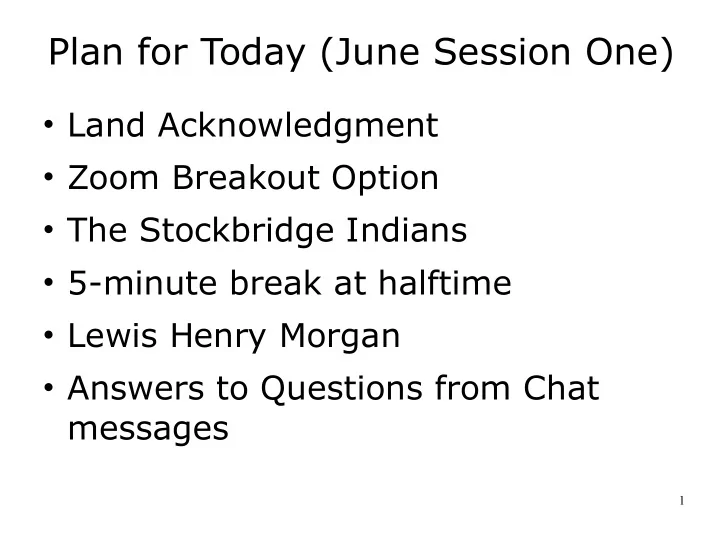

Plan for Today (June Session One) ● Land Acknowledgment ● Zoom Breakout Option ● The Stockbridge Indians ● 5-minute break at halftime ● Lewis Henry Morgan ● Answers to Questions from Chat messages 1
“Part 2” Fridays in June Greater detail on Algonkian culture and values ● Less emphasis on history, more emphasis on values, many of which persist to the present day ● Stories and Myths – Possible Guest Appearance(s) – Joseph Campbell's The Power of Myth ● Current/Recent Fiction 2
“Part 3” Fall OLLI Course Deeper dive into philosophy ● Cross-pollination (Interplay of European values and customs with those of the Native Americans) ● Comparison of the Theories of Balance ● Impact of the Little Ice Age ● Enlightenment Philosophers' misapprehension of prelapsarian “Primitives” ● Lessons learned and Opportunities lost ● Dealing with climate change, income inequality, and intellectual property ● Steady State Economics; Mutual Aid; DIY-bio 3 (biohacking) and much more
Sources for Today (in addition to the two books recommended) ● Grace Bidwell Wilcox (1891-1968) ● Richard Bidwell Wilcox “John Trusler's Conversations with the Wappinger Chiefs on Civilization” c. 1810 ● Patrick Frazier The Mohicans of Stockbridge ● Daniel Noah Moses The Promise of Progress: The Life and Work of Lewis Henry Morgan 4
5
Indigenous Cultures Part 2 1491: New Revelations of the Americas Before Columbus ● People arrived in the Americas earlier than had been thought ● There were many more people in the Americas than in previous estimates ● American cultures were far more sophisticated than had been believed ● Environmental management was widespread and hugely impactful (belying the concept of “ wilderness ”) 6
Indigenous Cultures Part 2 1491: New Revelations of the Americas Before Columbus ● People arrived in the Americas earlier than had been thought ● There were many more people in the Americas than in previous estimates ● American cultures were far more sophisticated than had been believed ● Environmental management was widespread and hugely impactful (belying the concept of “ wilderness ”) 7
People arrived in the Americas earlier than had been thought Laurentine Glaciation ● Our part of the “New World” was inhabited before parts of northern Europe ● More of the Continental Shelf was exposed “History is written by the victors” ● What was Holmberg's Mistake? ● Who controlled the narrative that we (of European descent) have come to know? [rhetorical question!] 8
9
-14K {LGM = -25K to -20K} http://academic.emporia.edu/aberjame/student/martin1/laurentide.html 10
11
12
13
14
15
16
17
18
King Philip's War (1675-6) ● Ousamequin (1581-1661), Massasoit Sachem [Sakama/ Sagamore – Ogma in the West] of the Wampanoag – mas = large, much [Masajosek] – sawa = dress, clothe, clothing – saka = stand / sakmet = one stands ● Sons were Alexander (Wamsutta 1634- 1662) and Philip (Metacom 1638-1676) ● Philip's wife and one son sold into slavery 19
20
Stockbridge Indians Timeline ● Backgound Schodack Island (Fort Nassau 1614-7) 1722 Aupaumut/Yokun – Esquatak is an Indian name meaning "the fireplace of the – nation," so called because the council-seat of the famed Mohican Indians was located in the Town of Schodack. https://esquatak.org/ [Abenaki skudek = “at the fire” – skweda-al = “fire-s” – Skwedaigok = “The place of the fires”] Albany (Fort Orange 1624) – ● Beaver Wars (1609-1701) – 1628 Mohawks drove Mohicans west (1675 buried the hatchet, Wappingers joined) – King Philip's War (1675-6) ● Indiantown (a Praying Town) organized in 1730s as a refuge for the Indians 21
Stockbridge Indians Timeline II ● 1734 John Sergeant came to Wnahktukuk ● 1739 Indiantown was incorporated as Stockbridge ● In 1783 the Stockbridge Indians left for Oneida country and founded New Stockbridge in New York state ● In 1818 they were forced to move again ● And again in 1822, on to Wisconsin ● more details at https://www.mohican.com/?url=origin-early-history 22
Growth of Stockbridge ● 1740 – 120 Indians, 3 colonial families ● 1759 – 42 Indian families, Stephen West arrived with 19 th colonial family ● 1763 – 32 colonial families ● 1770 – 50 colonial families ● 1776 – ~200 Indians, ~1,000 colonials ● 1783 – departure to Oneida country 23
Some of the Major Players ● John Konkapot (Pohpnehounuwuh) ● Aaron Umpachenee (Sonkenewenaukeek) ● John Sergeant and Timothy Woodbridge ● Ephraim Williams and Jonahan Edwards ● Governor Belcher and Colonel John Ashley ● (Lord) Jeffery Amherst and Jehoikim Yokun ● Daniel Ninham, Jacob Cheeksaunkun, Solomon Uhhaunauwaunmut, and John Naunauphtaunk (to London in 1766) 24
Sculpture of Sachem Daniel Nimham (1726-1778) by Michael Keropian 10" bronze sculpture of a Native American chieftain in traditional dress https://www.keropiansculpture.com/daniel_nimham.html https://www.americanindianmagazine.org/story/road-kingsbridge-daniel-nimham-and- stockbridge-indian-company-american-revolution 25
Recommend
More recommend